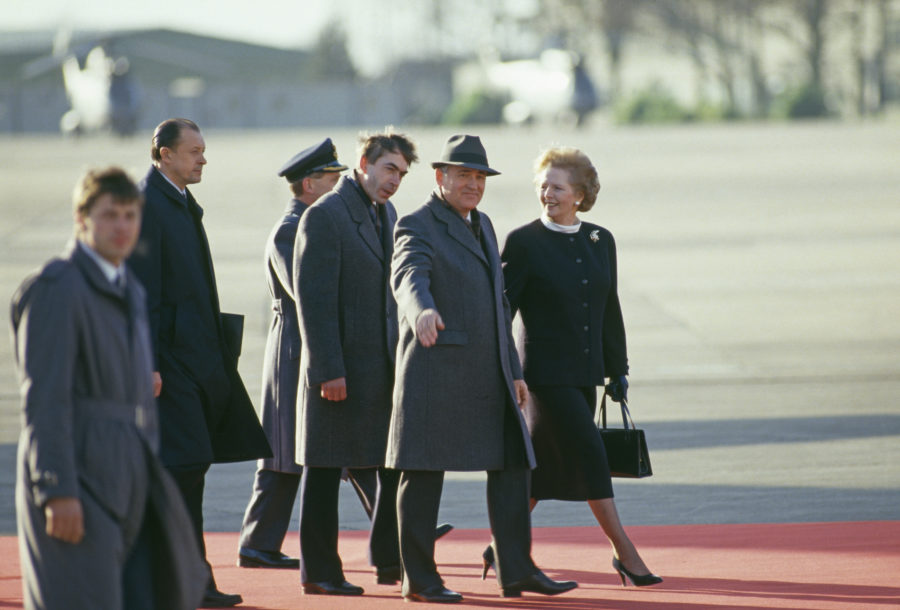Marking the 90th birthday of former Soviet leader Mikhail Gorbachev, Gill Bennett recalls how the late Tony Bishop, FCO Russian specialist, recorded Gorbachev’s first talks with Margaret Thatcher, when he acted as interpreter.
‘For heaven’s sake, try and find me a young Russian!’ This, according to Tony Bishop, the Foreign & Commonwealth Office (FCO) principal Russian interpreter, was what Margaret Thatcher said to her advisers when flying back to London after attending the funeral of Soviet leader Andropov in February 1984.[1]
In fact, she had already been told that Mikhail Gorbachev was a young man to watch. Professor Archie Brown, one of the academics summoned to a seminar at Chequers in September 1983, had described him as ‘the best-educated member of the Politburo and probably the most open-minded’, leading the Prime Minister to suggest it would be a good idea to invite him to Britain.[2] FCO views of Gorbachev were also complimentary, though wary. He was, officials reminded the Prime Minister, still a Communist.
By the time Gorbachev visited Britain in December 1984, he was number 2 in the Soviet hierarchy, and Chairman of the Foreign Affairs Committee of the Supreme Soviet. Before his arrival, the FCO prepared extensive briefing for the Prime Minister. During the visit Mikhail Gorbachev and his wife Raisa lunched with the Prime Minister at Chequers, their conversation described by Thatcher’s biographer as ‘one of the most remarkable every to have taken place across that dining table’. At times the discussion was hard-hitting, the Prime Minister ‘deliberately and breathtakingly… cross-examining him about the inferiority of the Soviet centralised command system and the merits of free enterprise and competition’.
Tony Bishop’s account of that visit, Mikhail Sergeevich Gorbachev: A personal assessment of the man during his visit to the United Kingdom, 15-21 December 1984,[3] is a masterpiece of the kind of analysis that Tony had produced while interpreting for Prime Ministers since the days of Harold Macmillan. Re-reading it now, it seems a fitting birthday tribute to the former President. Though not uncritical, it pays tribute to his qualities: ‘There was about his movements and his utterances an unaffected, self-assured and un-self-conscious air of competence and confidence’. Though Gorbachev’s conviction about the ‘rightness and superiority of the Soviet system’ was heartfelt, he took an interest in everything he saw in Britain, seeming ‘genuinely impressed by the British sense of tradition’ and technical innovation.
In December 1984, Gorbachev’s political future was still unknown. But as Tony put it, ‘If the Soviet Union one day needs the kind of leader who, like a General on the eve of battle, can put new heart into his troops simply by going quietly and reassuring among them, then Gorbachev could be their man.’
On the death of Chernenko in March 1985, Gorbachev succeeded him as General Secretary of the Communist Party of the Soviet Union. He was indeed ‘their man’. He was also, as Thatcher famously said, a man she could do business with. And although they did not always see eye to eye, she remained convinced that it was with Mikhail Gorbachev that the best hopes for peace lay.
Four years later, as the Berlin Wall fell and, as British Ambassador in Moscow Sir Rodric Braithwaite put it, ‘Gorbachev’s policy in Eastern Europe is being overrun by events’,[4] the Prime Minister insisted that ‘the crucial element is Gorbachev’s survival’.[5] In the end, the pace of change forced both leaders to adapt their views and policies. But there remained a strong understanding between them: and according to Tony Bishop, Mrs Thatcher was always attracted by the ‘roguish twinkle’ which, Tony said, was never far from Mr Gorbachev’s eye.
[1] Tony Bishop, FCO Research Analyst and Principal Conference Interpreter, who died in 2012, described this incident to Thatcher’s biographer Charles Moore: see Margaret Thatcher: The Authorized Biography, Volume Two: Everything She Wants (London: Allen Lane, 2015), p.228.
[2] Moore, p.111.
[3] This document is available at The National Archives in PREM 19/1394, and on GOV.UK: Mikhail Gorbachev – a personal assessment
[4] FCDO Historians, Documents on British Policy Overseas (DBPO), Series III, Vol. VII, No.40.
[5] Ibid, No.48.

